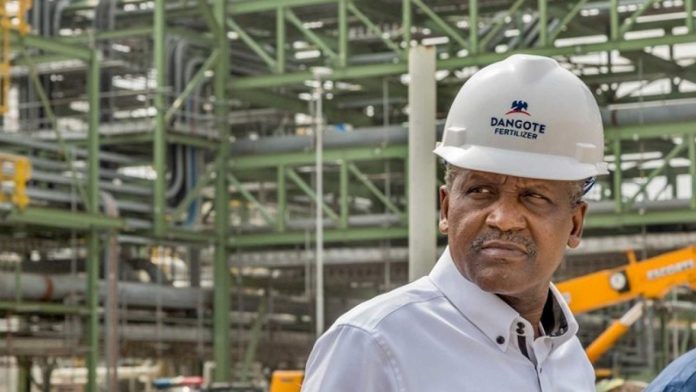After being denied unhindered access to crude oil by certain interests in the sector, the Dangote Group, owner of Africa’s largest refinery, has disclosed that it is set to begin crude oil production at two Nigerian oil assets in the fourth quarter of 2024, according to a report by S&P Global Commodity Insights released recently.
The report, citing company sources, noted that Dangote is actively searching for a floating production, storage, and offloading vessel capable of holding 650,000 barrels of crude oil. The company source said production at the company’s two Niger Delta upstream projects in Oil Mining Leases 71 and 72 would start at around 20,000 b/d, before ramping up further in the first quarter of 2025.
Dangote Group holds an 85% stake in West African E&P Venture, which has a 45% working interest in the two blocks, while the Nigerian National Petroleum Company (NNPC) holds the remaining 55%. Another key stakeholder in West African E&P is Nigerian upstream company First E&P, which operates Oil Mining Leases (OMLs) 71 and 72.
The licenses for these blocks are located in shallow waters in the southeastern Niger Delta, approximately 22 km from the onshore Bonny terminal. The area contains the Kalaekule and Koronama oilfields.
Since the 650,000 barrel-per-day refinery began operations, Dangote has faced a crude oil supply crisis, particularly from the national oil company, NNPC. As a result, the refinery has had to rely on imported crude from countries such as Brazil, the U.S., and others.
This issue worsened amid tensions with international oil companies (IOCs), with Dangote accusing them of attempting to undermine the refinery’s success through price gouging and manipulation of crude sales.
In response to the ongoing dispute, the federal government approved the sale of crude oil to Dangote in naira, streamlining the transaction process and providing relief for the refinery. To date, Dangote refinery has supplied petroleum products to the NNPC and is expected to begin sales to local marketers in the coming weeks, as the NNPC has ceased being the sole off-taker of Dangote fuel.
Africa’s wealthiest man, AlikoDangote, completed the $20 billion Dangote Refinery, a landmark project with the capacity to process 650,000 barrels of oil per day. Once fully operational, it will become the largest refinery across both Africa and Europe, with full capacity expected to be reached this year or next. The refinery aims to significantly reduce Nigeria’s heavy reliance on imported petroleum products.
Although Nigeria is Africa’s top oil producer and most populous nation, it imports nearly all of its fuel due to insufficient refining infrastructure, a gap the Dangote refinery said it is out to address.
Meanwhile, Dangote Refinery has announced plans to transport 75 per cent of its local petroleum product supply via sea routes, targeting key locations like Warri, Port Harcourt and Calabar, despite having the capacity to load 83 per cent of its products by road.
Vice President (Oil & Gas),Dangote Industries Limited, Devakumar Edwin, disclosed this while speaking recently on distributing Premium Motor Spirit (PMS). He noted that the shift to sea transportation aims to reduce the higher costs associated with road distribution.
As the largest single-train refinery globally, Edwin stated that Dangote Refinery offers both sea and road export options but is ramping up efforts to evacuate nearly all production by sea. Products for Calabar, Port Harcourt, Warri, Apapa and Atlas will primarily move by sea, with road transport reserved for urgent needs, easing pressure on road infrastructure and cutting transhipment costs.
“We have both exporting facilities by sea and by road. 75% of the production can be evacuated through sea. In fact, now we are ramping up to make it even 100%. Anything going to Calabar, Port Harcourt, Warri, Apapa, Atlas can all be taken through the sea. So only what is imminently required by road can be taken.
“But I also have the facility to load 83% of my production also through road. We have just built-in flexibility but we can avoid all traffic congestion on the road by evacuating through sea and it will also bring down the cost of transhipment”, Edwin explained.
Edwin further noted that most products destined for central Nigeria can be shipped from Port Harcourt and Warri, while those for the East and Northeast can be moved from Calabar. This shift to sea transport, he noted, will significantly reduce costs and ultimately lower prices for consumers.
Dangote Refinery, with the capacity to load 40 tankers of PMS simultaneously in 40 minutes and manage up to 2,900 trucks daily, poses a significant risk of traffic congestion along the Lekki-Epe corridor, prompting a shift to sea transportation.
Given the influx of tankers from the refinery and other establishments in the Lagos Free Trade Zone, the Lagos State Government has implemented several measures to mitigate potential traffic issues.
One key initiative includes equipping the Lagos State Traffic Management Authority (LASTMA) with advanced tow trucks, emergency tools, and ambulance services, along with deploying personnel strategically along the Lekki-Ajah corridor as the refinery begins petrol distribution.
Additionally, the Lagos State Government has announced that the electronic call-up (e-call-up) system will be activated on the Lekki-Epe corridor from September 23, 2024, after a previously scheduled launch in August was postponed. The e-call-up system is designed to tackle the persistent congestion caused by the influx of articulated trucks.


